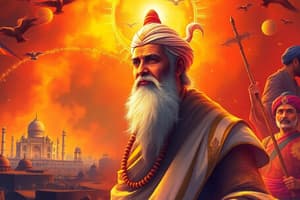Podcast
Questions and Answers
What was the primary stance of the Simon Commission regarding the enumeration of Fundamental Rights?
What was the primary stance of the Simon Commission regarding the enumeration of Fundamental Rights?
- It opposed the enumeration of Fundamental Rights. (correct)
- It suggested a temporary postponement of the enumeration.
- It deemed the enumeration of Fundamental Rights necessary.
- It supported the enumeration of Fundamental Rights.
Which committee expressed the opinion that Fundamental Rights should be expressly guaranteed in the Constitution?
Which committee expressed the opinion that Fundamental Rights should be expressly guaranteed in the Constitution?
- The Joint Select Committee
- The Sapru Committee (correct)
- The Simon Commission
- The British Cabinet Mission
What significant right under Article 32 does the Indian Constitution provide?
What significant right under Article 32 does the Indian Constitution provide?
- The right to form political parties
- The right to move the Supreme Court for enforcement of Fundamental Rights (correct)
- The right to education
- The right to free speech
Which feature distinguishes the Indian Constitution regarding Fundamental Rights according to Seervai?
Which feature distinguishes the Indian Constitution regarding Fundamental Rights according to Seervai?
What does the English Bill of Rights, 1689, primarily declare?
What does the English Bill of Rights, 1689, primarily declare?
In what context does the doctrine of Ultra vires not apply according to the document?
In what context does the doctrine of Ultra vires not apply according to the document?
What does Article 32 of the Indian Constitution relate to?
What does Article 32 of the Indian Constitution relate to?
Which writs are considered essential components of judicial review power in the context of the Indian Constitution?
Which writs are considered essential components of judicial review power in the context of the Indian Constitution?
What is the origin of the idea of constitutionalism based on?
What is the origin of the idea of constitutionalism based on?
According to Aristotle, what is the nature of human beings?
According to Aristotle, what is the nature of human beings?
What does Robert M MacIver suggest about the necessity for regulation in a family?
What does Robert M MacIver suggest about the necessity for regulation in a family?
How does MacIver differentiate between 'state' and 'government'?
How does MacIver differentiate between 'state' and 'government'?
What necessity does the content suggest led to the formation of laws and government?
What necessity does the content suggest led to the formation of laws and government?
Which statement best represents the essence of constitutional law?
Which statement best represents the essence of constitutional law?
What is implied as a primary concern in establishing a government?
What is implied as a primary concern in establishing a government?
According to the content, what role does community play in the concept of governance?
According to the content, what role does community play in the concept of governance?
What powers does Article 352 of the Indian Constitution grant the Union Government during emergencies?
What powers does Article 352 of the Indian Constitution grant the Union Government during emergencies?
Which articles in Schedule VII pertain to the powers related to foreign policy exclusively entrusted to the Union?
Which articles in Schedule VII pertain to the powers related to foreign policy exclusively entrusted to the Union?
Under Article 254(1), which law prevails in the event of a conflict between state law and central law?
Under Article 254(1), which law prevails in the event of a conflict between state law and central law?
What does Article 253 empower the Parliament to do?
What does Article 253 empower the Parliament to do?
What role does Article 200 play regarding state laws?
What role does Article 200 play regarding state laws?
What obligation does Article 324(6) impose on the President and State Governors?
What obligation does Article 324(6) impose on the President and State Governors?
During a state of emergency affecting war powers, which article confers authority to the Union?
During a state of emergency affecting war powers, which article confers authority to the Union?
What dependency does the Union Government have on states concerning national programmes?
What dependency does the Union Government have on states concerning national programmes?
What was the primary reason for the formation of the Indian Union?
What was the primary reason for the formation of the Indian Union?
What are the three lists that define the division of powers in the Indian Federation?
What are the three lists that define the division of powers in the Indian Federation?
Which statement best reflects Ambedkar's view on the Indian Federation?
Which statement best reflects Ambedkar's view on the Indian Federation?
How does the Indian Constitution's federal structure differ from the American Constitution's?
How does the Indian Constitution's federal structure differ from the American Constitution's?
What led to the recognition of Jammu and Kashmir's special status in the Indian Union?
What led to the recognition of Jammu and Kashmir's special status in the Indian Union?
In what way was the Indian federation comprised originally?
In what way was the Indian federation comprised originally?
What mechanism does the Indian Constitution incorporate concerning its federal structure?
What mechanism does the Indian Constitution incorporate concerning its federal structure?
What is a significant outcome of the reorganization of States in India?
What is a significant outcome of the reorganization of States in India?
What significant change was made to the Indian Constitution by the 42nd Amendment Act in 1976?
What significant change was made to the Indian Constitution by the 42nd Amendment Act in 1976?
Which of the following features reflects the democratic nature of India as per its Constitution?
Which of the following features reflects the democratic nature of India as per its Constitution?
What does the term 'Secular' imply about the Indian state?
What does the term 'Secular' imply about the Indian state?
According to the Constitution, what does the term 'Sovereign' signify?
According to the Constitution, what does the term 'Sovereign' signify?
How many Articles were added to the Constitution between 1950 and 1995?
How many Articles were added to the Constitution between 1950 and 1995?
What structure does the Constitution of India establish?
What structure does the Constitution of India establish?
What does the term 'Republic' in the Indian Constitution mean?
What does the term 'Republic' in the Indian Constitution mean?
Which aspect of the Indian Constitution reflects the incorporation of ideas from the German Reich?
Which aspect of the Indian Constitution reflects the incorporation of ideas from the German Reich?
Study Notes
Foundation of Government and Constitutionalism
- Three fundamental questions: necessity of government, best form of government, and preventing tyranny initiated the concept of constitutionalism.
- Constitution is a framework of doctrines and practices for organizing a state.
- Aristotle posited that humans are social and political beings, necessitating community formation and regulations.
- Robert M. MacIver connected family governance to municipal governance, explaining the distinction between the state and its government.
Historical Context and Fundamental Rights
- Simon Commission (1930) rejected formalizing Fundamental Rights, deeming them ineffective without enforceability.
- Indian National Congress in March 1931 advocated for written guarantees of Fundamental Rights in future constitutions.
- The Government of India Act 1935 did not include Fundamental Rights, despite demands from the Sapru Committee and the British Cabinet Mission Plan.
- Article 32 of the Indian Constitution introduced the right to approach the Supreme Court for enforcing Fundamental Rights.
Structure of Indian Federation
- India transitioned to a federation post-independence, uniting various princely states into the Indian Union.
- Unlike most federations formed from independent states, India's federation arose from a centralized unitary state.
- Indian Constitution made clear delineations of powers between the Union and States through Union, States, and Concurrent Lists.
- The special status accorded to Jammu and Kashmir via the Twenty Second Amendment reflects the gradual state reorganization process.
Federal vs. Unitary Characteristics
- Constituent Assembly emphasized a strong Center, responding to socio-political conditions.
- Ambedkar articulated the dual polity of Indian federalism, balancing strong central authority while allowing state sovereignty.
- Provisions enabled the Constitution to assume unitary characteristics in emergency situations, enhancing the Union's powers.
War and Foreign Policy Powers
- Exclusive war and foreign policy powers vested in the Union; Article 352 allows for emergency declarations and top-down control.
- Article 246 details legislative powers related to defense and foreign policy, centralizing authority during crises.
Concurrent Powers and Legislative Conflicts
- The Concurrent List permits both Union and State legislation; Article 254 prioritizes Union laws in case of conflict.
- State laws may prevail if reserved for the President's consideration and receive assent, establishing a complex legislative hierarchy.
Administrative Relations and National Programs
- Union relies on states for local administration of national programs; Article 324 mandates cooperation for electoral functions.
- Constitution has evolved since its inception, currently comprising 443 Articles post-78th Amendment, reflecting ongoing legislative adjustments.
Preamble and Core Values
- India is defined as a Sovereign, Socialist, Secular, Democratic Republic in its Preamble.
- Sovereignty asserts independence from external authority; socialism indicates state involvement in production and distribution.
- Secularism promotes equal treatment of all religions without state preference, while democracy affirms government derived from popular consent.
- Republic signifies electing a head of State, contrasting hereditary systems like that in the UK; the President of India serves as the Chief Executive.
Studying That Suits You
Use AI to generate personalized quizzes and flashcards to suit your learning preferences.
Related Documents
Description
Explore the philosophical and historical roots of the Indian Constitution in this insightful quiz. Analyze key questions surrounding governance and its necessity throughout civilization. Delve into the principles that shape the structure of government as envisioned in the Constitution.




